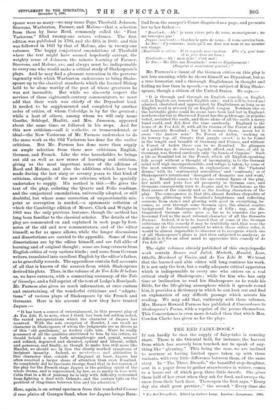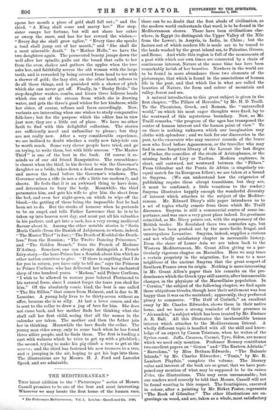THE RED FAIRY-BOOK.*
IT can hardly be that the supply of fairy-tales is running short. There is the Oriental field, for instance, the harvest from which has scarcely been touched, not to speak of any- thing like " gleaning." This being the case, we are inclined to murmur at baying limited space taken up with three variants, with very little difference between them, of the same story. In "The Three Dwarfs," the beautiful step-daughter, sent in a paper dress to gather strawberries in winter, comes to a house out of which peep three little dwarfs. She gives them half of her crust when they ask for food, and sweeps the snow from their back door. Thereupon the first says, " Every day she shall grow prettier ; " the second, " Every time she • The Red Fairy-Book. Edited by Andrew Lang. London : Longman. 1880. opens her mouth a piece of gold shall fall out ; " and the third, " A Sing shall come and marry her." Her step- sister essays her fortune, but will not share her cakes or sweep the snow, and has for her reward the wishes,— " Every day she shall grow uglier," "Every time she speaks a toad shall jump out of her mouth," and " She shall die a most miserable death." In " Mother Holle," we have the two daughters again. The persecuted beauty jumps down the well after her spindle, pulls out the bread that calls to her from the oven, shakes and gathers the apples when the tree asks her, and faithfully serves the old woman with the large teeth, and is rewarded by being covered from head to toe with a shower of gold; the lazy slut, on the other hand, refuses to do all these things, and is punished with a shower of pitch which she can never get off. Finally, in " Busby Bride," the step-daughter washes, combs, and kisses three hideous heads which rise out of the stream from which she is drawing water, and gets the three's good wishes for her kindness, while her sister, of course, refuses and fares accordingly. Now, variants are interesting when one wishes to study comparative folk-lore ; but for the purpose which the editor has in view just now, they are a little out of place. We have no other fault to find with this delightful collection. The stories are sufficiently novel and unfamiliar to please; but they are not really new. After a very considerable experience, we are inclined to doubt whether a really new fairy-tale can be worth much. Some very clever people have tried, and go on trying, to write them, but with little success. " The Master Thief " is one of the best in the book. Of course it re- minds us of our old friend Rampsinitus. The resemblance is closest when the thief, in his devices to win the Governor's daughter as a bride, takes down a dead man from the gallows, and moves the head before the Governor's windows. The Governor seizes a rifle (is not a rifle a little too modern ?), and shoots. He feels that it is an awkward thing to have done, and determines to bury the body. Meanwhile, the thief personates him, and gets his wife to give him the sheet from the bed, and even her night-gown, on which to wipe off the blood,—the getting of these being the impossible feat he had been set to do. But the stroke of humour when he pretends to be an angel, and tells Father Lawrence that he is to be taken up into heaven next day, and must put all his valuables in his parlour, and get into a sack, has a very strong medimval flavour about it. Among the other notable stories is " Soria Mork Castle (from the Danish of Asbjornsen, to whom, indeed, " The Master Thief "is due); " The Death of Koshkei the Death- less," from the Russian ; "The Twelve Dancing Princesses," and "The Golden Branch," from the French of Madame D'Aulnoy. Somehow, one can always distinguish a French fairy-story,--the hero-Prince has a flourish about him which no other nation contrives to give. " If there is anything that I do for you in return, you have only to tell me," says the Princess to Prince Curlicue, who has delivered her from her enchanted sleep of two hundred years. " Madam," said Prince Curlicue, "I wish to be allowed to restore your beloved Florimond to his natural form, since I cannot forget the tears you shed for him." Of the absolutely comic kind, the best is one called " The Six Sillies," that comes from Hainaut, and is due to M. Lemoine. A young lady lives to be thirty-seven without an offer, because she is so silly. At last a lover comes, and she is sent to the cellar to draw a jug of beer for him. She does not come back, and her mother finds her thinking what she shall call her first child, seeing that all the names in the calendar are taken. The mother and then the father join her in thinking. Meanwhile the beer floods the cellar. The young man rides away, only to come back when he has found three sillier people, and he finds them. The first is loading a cart with walnuts which he tries to get up with a pitchfork ; the second, trying to make his pig climb a tree to get at the acorns ; and the third has fastened his new trousers to a tree, and is jumping in the air, hoping to get his legs into them. The illustrations are by Messrs. H. J. Ford and Lancelot Speed, and are admirable.























































 Previous page
Previous page